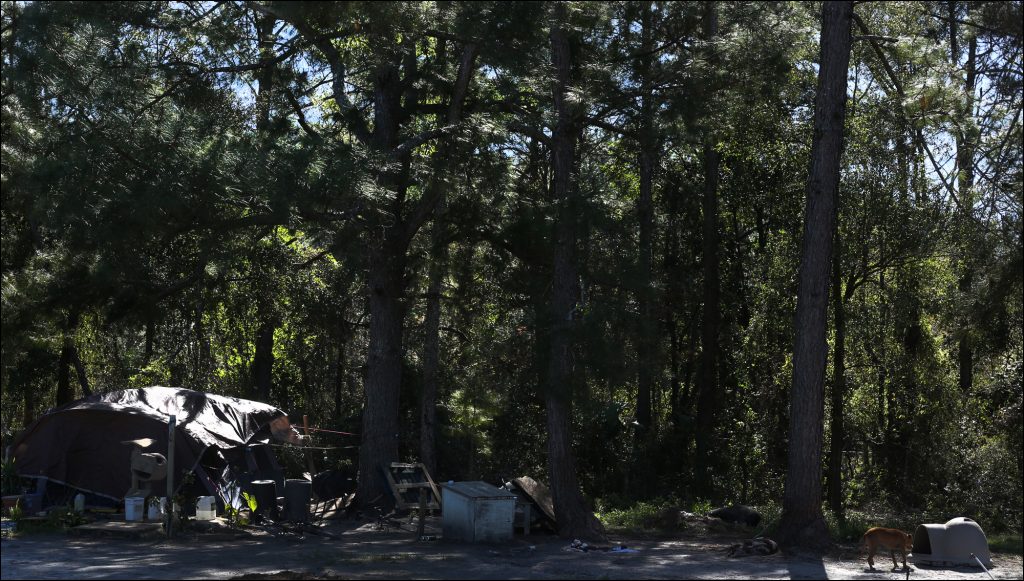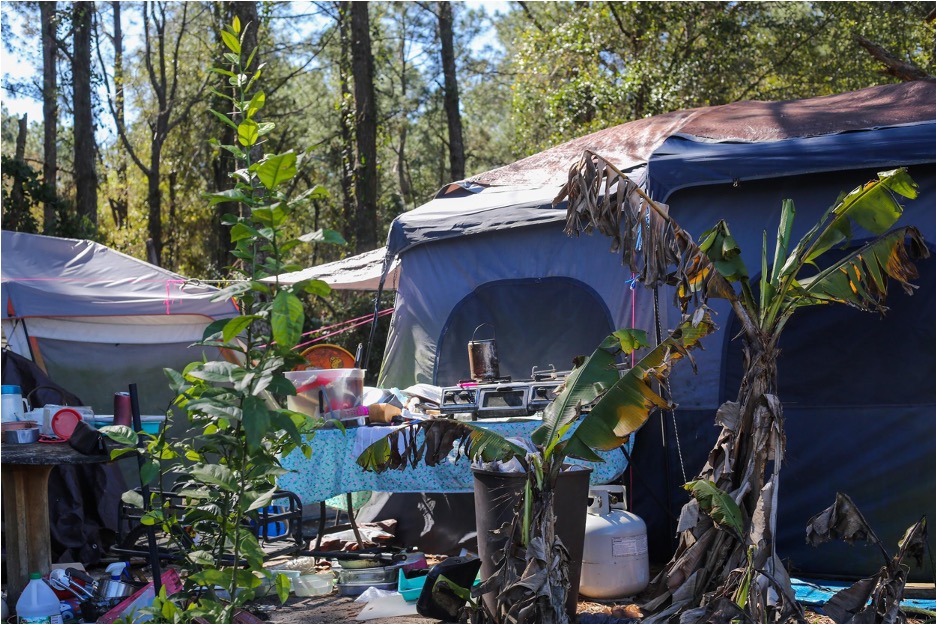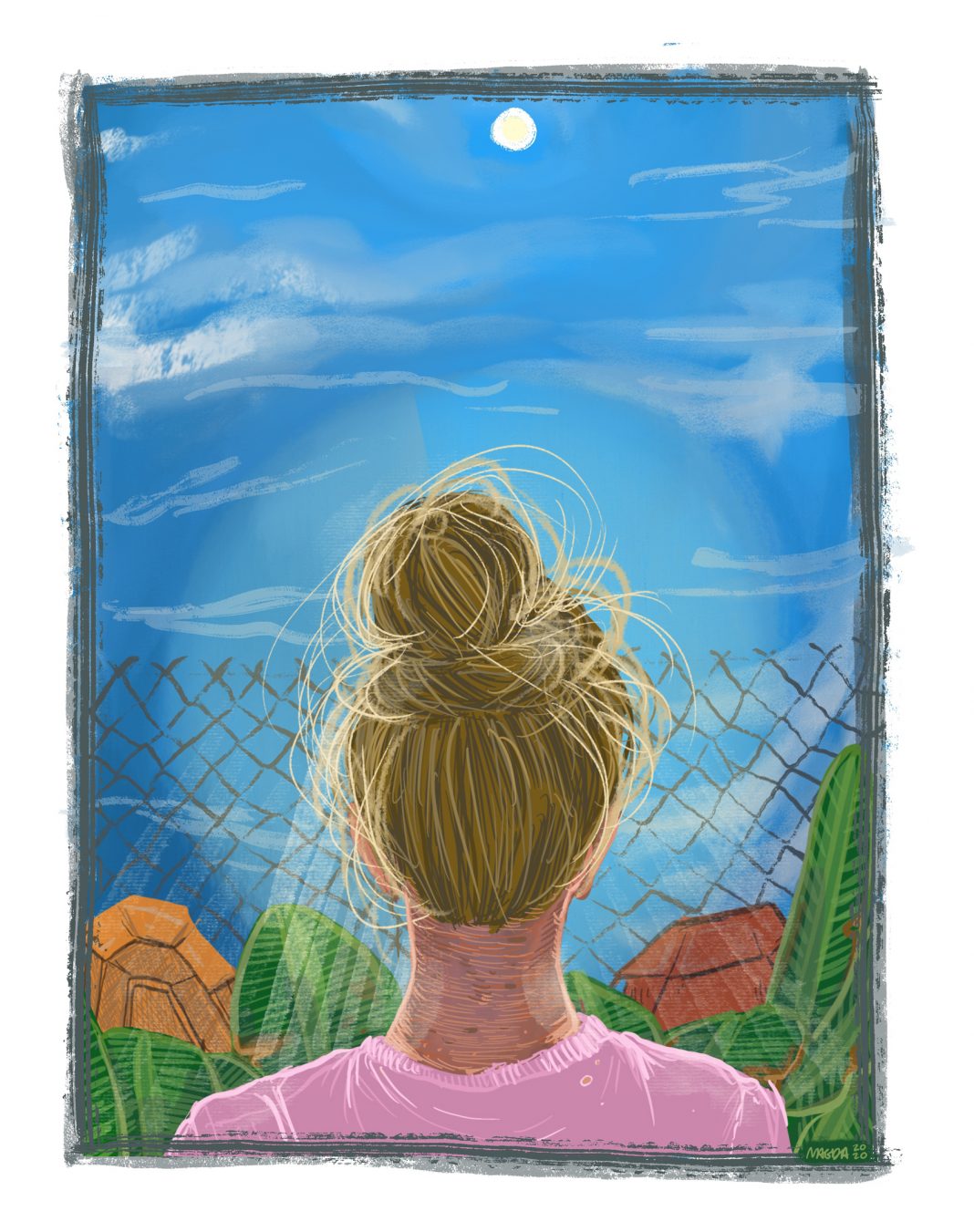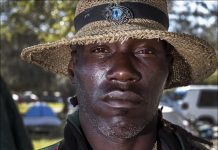By Katie Hyson
Published July 20, 2020
GAINESVILLE, Fla. — The day has tired Karen already. Two nights ago, the National Weather Service issued a tornado warning for Gainesville. Wind and icy rain seeped into Karen and Paul’s tent and soaked all their things. Their tent was made for vacations, for the thrill of sleeping in the woods as a break from normalcy, not to live in every day. It’s worn through. She spent the morning rewashing all her clothes.
The simplest tasks can take all day here. Earlier, a man removed her still-wet clothes from the dryer. She yelled at him. She was never angry before she lived here — this place changes people. She prays and asks God to calm her down.
Her anxiety medication just ran out. At night, when she is kept up by the sound of fighting and the fear of being robbed, she surrounds herself with her three cats and two dogs, puts gospel music on the radio and fills in a coloring book until she is calm enough to sleep.
Karen’s contagious laugh hides her anxiety well; the lines on her tanned face map six decades of more smiles than frowns. She is short, but the dirty blonde hair piled on her head adds another 6 inches. She has lived outside a chain-link fence for four years.
The fence surrounds Alachua County’s largest homeless shelter, GRACE Marketplace. It sits in a quiet northeast pocket of Gainesville, near the airport and the county fairgrounds. The eaves of the shelter buildings are painted in bright colors, but no amount of paint can hide that this used to be a prison. It was converted in 2014 as part of the county’s ambitious 10-year plan to end homelessness.
When a large tent city downtown was shut down shortly after, the residents were told they could encamp around the shelter instead. It seemed like a neat solution. The rest of the city was relieved to not see them anymore.
Hundreds of tents soon sprung up outside the shelter’s fence. Residents of the camp could access the shelter’s resources and public health basics: water, port-a-potties, trash pickup. A sign was driven into the ground with the camp’s new name: “Dignity Village.”
But years later, Dignity residents were no closer to being housed. The camp had only grown, fed by those fleeing cities with harsher homeless policing or colder climates or less vacant land. It became a common first stop after prison release.
Crime and violence were increasing in the camp, according to city records and interviews with dozens of Dignity Village residents. Emergency service vehicles were making almost daily visits. Social services outreach was nearly nonexistent.
In 2016, OrgCode Consulting, Inc., delivered an assessment of homelessness to the city: “Dignity Village is a massive policy and operational failure which is putting lives at risk and consuming considerable resources in a way that is not ending homelessness.” It recommended closing the camp.
The shelter offered to facilitate the closure by transitioning residents into the shelter or other housing, and city commissioners voted in support. Their goal was to close the camp by the end of 2019, without making arrests.
On this December day, the camp smells like sawdust. Inside the fence, 130 newly built platforms, exactly the size of one-man pup tents, rest on cement blocks inches apart.
In a couple of weeks, Dignity residents must move inside or leave. But many plan to go anywhere else, comparing it to a concentration camp, pointing out the apparent lack of shade, space and freedom. One of those residents is Karen.
Karen steps through a hole cut in the south side of the fence, one of many. She is on a mission to check the housing list.
Karen and Paul are on the waiting list for housing, expecting to receive six months to a year of rent and case management. After the decision to close, shelter staff prioritized all Dignity Village residents for rehousing. Karen’s hopes lie in getting rehoused before they close Dignity, because they cannot go inside that fence.
“I won’t know how to act!” she says about living in an apartment again, and covers her nerves with a laugh.
In Tampa, Karen and Paul used to explore the city, walk by the water, go dancing in Ybor City. There, they could be homeless and still have what felt like a normal life.
In Gainesville, the way people look at her makes her feel like a different species. She stopped leaving the camp.
Living here feels to Karen like being zapped to another planet. Over 300 homeless men and women, the staff who assist them, the drug dealers who exploit them, the cops and paramedics who try to save their bodies, and the churches who try to save their souls — these are the only people on this planet.
Karen goes first to the front office, where the receptionist tells her she can check the housing list online.
“What’s the website?” Karen asks, but the receptionist doesn’t know, and they have run out of the paper slips that list it.
This launches Karen on what turns into a half-day quest to find the website. She zig-zags the entire campus. Each line she has to wait in, each person she has to talk to, each place she has to go ramps up her anxiety.
This is why people here are always ready to pop off, she says. It seems like no one knows anything.
It’s a small bureaucratic snafu, the kind anyone navigating a large system expects. But Karen’s life now seems to be run by mishaps like this. They stand between her and a roof that keeps the rain out.
She checks the pavilion to see if the website is taped up there, but it’s not. The pavilion resembles a makeshift wartime hospital, rows of beds a foot apart, a mass of blankets — overflow from the full dormitories. A woman cries out to Karen from a bed, her arm stretching out.
The woman is recovering from a drug bender. Her wrist is swollen and she doesn’t know why. She can’t remember what happened in the last three days.
Karen cradles the woman’s head in her arms and smooths her hair.
“Oh, you poor thing,” Karen says.
Karen examines her wrist, gives the soothing reassurances of a mother.
Not everyone here uses. People would be surprised to know who’s out here, Karen says — current hospital and school employees whose incomes haven’t kept pace with the skyrocketing Gainesville rent. Worn American flags flutter outside veterans’ tents.
Hours later, the name of the website finally in her hand, she signs onto a shelter computer and carefully types: North Central Florida Alliance for the Homeless and Hungry. The site shows a list of five-digit numbers that correspond with people the organization is now ready to rehouse.
One rock through a window can throw you off course
Karen’s head rests in her palm, blue eyes wide, as she scrolls slowly through the list. She does not see her number. She starts again at the top and scrolls even slower. She types “35841” in the search bar. No results.
Karen could be a patron saint of things left to die. All her animals were rescues. Zeus, the pit, was black with fleas when she took him in. Cesar, the boxer, bites people — nobody else would take him. She works part time through AARP at the Humane Society thrift store.
An astonishing menagerie of plants surrounds her tent, and she rescued them, too. Gardenias, a milk plant, aloe, all kinds of fruit trees. Shelter staff hand the dying plants to Karen, and she roots them by her tent and brings them back to life. A garden border and a cat tower give the camp an oddly permanent look. She saved big kitchen barrels from being tossed into the dumpster and set them up to collect rainwater for the plants.
She takes in people, too, especially young ones. Many here call her “Mama.” Who else could they come to?
She doesn’t begrudge God for bringing her here. It shook the materialism out of her, and she’s grateful for that. She tells Paul she’d rather live under a bridge with him than in a mansion with someone else.
God is preparing her. One day, she hopes to open a shelter for young people and abused animals. They could use each other.
Behind the rain barrels, Karen sinks into the netting of her camp chair, a shiny ribbon around her messy bun, “Plots and Errors” by Jill McGown in her hand. It’s Christmas.
She is drowsy from cold medicine, and she can’t shake this cough, but she is smiling. The sun dried everything out from the cold drizzle that fell yesterday. Later, she and Paul will give gifts to the dogs, who are wild about Christmas, and the cats, who seem ambivalent about it. Small joys.
She remembers the small joys her mother would bring home on Christmas — big sacks of grapefruit, apples and oranges, candied ribbons that reminded Karen of roller coasters. Her mother would parcel the treats out to their family of seven in rural Arkansas.
They were too poor to fit in at school. Besides, Karen wore big glasses and had stringy hair, and though she tried cheerleading she wasn’t good at it.
At 11, she got her first job dusting shelves at the convenience store for a dollar an hour. She participated in her school’s work program, covering the cost of her uniform and supplies by scraping gum, washing buses and redoing the floors.
She thought about being a teacher but had no patience for it, wanted to be an airline stewardess but was scared of flying. Instead, for decades to come, she would take whatever jobs were available, often paying the price with her body. She is still waiting to be approved for disability from the toll the hydraulics plant took on her shoulder and back. Social services rejected her application twice and she cannot fathom why, but she is a hopeful person. She applied again. She will wait.
Though she remembers poverty well, she doesn’t remember any homeless people in the Arkansas of her youth. They must’ve existed, she says, but she never saw them, and had a vague belief that homeless people were crazy drunks. She never, ever imagined she would become homeless.
It was an abusive man, in the end, that landed Karen in a shelter — a story shared by one in every four homeless women in the United States. When he comes up in conversation, her eyes grow distant and she trails off. She does not cover that time of her life with a smile like she does everything else.
As soon as the chance came, she packed a bag and went straight from his place to the Salvation Army shelter. Better to be homeless and safe.
Karen prayed for the next four years for a man who would not cheat on her or beat her, and God sent her Paul.
The first day he walked into the Salvation Army thrift store, she ignored him. But he came back on a hot day, handed her a cold blue Gatorade and left without a word. Later, when she stopped to drink the Gatorade under an underpass, Paul walked up. They haven’t separated since.
She hadn’t thought she’d find love again — what do you offer to a relationship when you’re homeless? But Paul was homeless, too, and it worked.
When Paul lost his job in 2015, they decided to drive to Tallahassee to crash with his brother while they got back on their feet. They had enough money for gas and nothing else, but they were in good spirits that day.
Right before they left, someone threw a rock through their car window.
Karen says she used to think that if you worked hard and did what you’re supposed to, you’d stay on track. She understands now that one bump in the road, one rock through a window, can knock you off course.
An officer pulled them over just outside of Gainesville and told them they couldn’t drive any further with a busted window. He gave them directions to the shelter.
Karen remembers a kind staff member who let them park inside and gave them blankets, pillows and something to eat. They planned to stay there while they saved to fix the window.
Before they could, a car hit and killed Paul’s brother.
They no longer had a reason to go.
Paul begged Karen to move outside the shelter into Dignity Village. He had been in prison before, and though he didn’t say it directly, she understood why he couldn’t stand being inside that fence. Better to be homeless and free.
Paul’s family wants to take him home to Alabama, but he refuses to go without Karen and the pets. Better to be homeless and together.
Karen never told her family. She has a brother and a sister still living, as well as a daughter, a son and grandkids. They would try to take her home if they knew. But she has never relied on her family for anything and she won’t start now. Better to be homeless and independent.
Not that it’s easy being without them. She misses the routine of family bonding — watching the Christmas parade, decorating, turning the kitchen into a candy factory. Maybe she’ll message them on Facebook later.
A fight breaks out next to her.
Karen never did get her anxiety medications refilled — this cold kept her from going to the clinic. She tenses in her chair and sighs.
Next year, if everything works, if they get rehoused in time and Paul gets a job and her disability kicks in, she’d like to go home for Christmas. Or maybe, in their own home, they can start their own traditions. The thought makes her smile.

The speed of bureaucracy
Five days before the new year, Jeff Gruver, manager of the upcoming transition, organizes a meeting with Dignity Village residents. Gruver sports tattooed arms and trendy, thick-framed glasses.
They’ve thought this through thoroughly, he says. They’ll open a pet shelter with animal advocates and a doggy run. Gruver’s staff excels at crisis intervention and de-escalation, and they’re hiring a few more advocates for night shifts. At least inside the fence there are lights and people nearby. There’s no curfew and a lot of autonomy. The residents are scared of the unknown, he understands, but he hopes after a few weeks people will settle in and realize it’s not constrictive.
The timeline has been bumped back, he explains to the dozen residents who showed up. The fence around Dignity will be completed in the next two weeks. Hard closure of Dignity will begin in March. By then, he hopes, everyone will be connected to appropriate resources.
“The city has failed us,” one man asserts, and there are murmurs of agreement around the room.
“We’re moving at the speed of bureaucracy,” Gruver says, and it sounds like he has said this phrase many, many times.
“It’s not their fault,” another resident says, gesturing toward the staff.
One resident raises his hand and says he’d like to give his compliments to Jerry Giardina and Courtney Jones, outreach specialists for Dignity Village, and another seconds the motion.
Karen walks in as they are wrapping up, in a shirt that says, “Lucky You.” The posted signs gave the wrong location for the meeting.
“We was all at the training building,” she says to Gruver, then laughs.
Karen explains she can’t move inside the fence; she has a dog that bites everyone.
“Maybe you need to get rid of a dog that’s biting everyone,” Gruver says.
“I ain’t getting rid of my baby!” Karen says, and her eyes flare, but then she laughs.
She tells him she is waiting on disability. Paul’s family is trying to get them a place with them, but it’s a last resort. They don’t like her, Karen says.
“How do you not like someone you haven’t met yet?” she asks.
She tells Gruver her tent is falling apart, and she’ll have to buy a new one because of the delay. There is stress in her voice, but she laughs again.
“Courtney,” she calls. “Y’all gonna stay in touch with us about housing?”
“Yes ma’am.”
“Anything I’m supposed to be doing? Somebody I should go speak to or see?”
“You’re doing it,” Jones reassures.
Karen had let the garden go in anticipation of moving, but she supposes now she should clean yard.
Stuck in the cracks
Two weeks later, Karen is coloring, the camping footrest in front of her filled with a hundred neon gel pens. It is the only way she knows to cope with the stress of the news she just received.
She went to her paralegal at a nonprofit law firm to check on her disability claim. It was rejected again. But there was more.
Did you refuse housing in 2018? he asked.
No, Karen said. Why would I refuse housing?
The paralegal told Karen she wasn’t on the housing list, and hadn’t been since 2018.
She went straight to Jones and Giardina, who told her they would work it out. But how long would it take now?
Fence construction has continued around Dignity Village as promised. Each new section counts down to the day she will no longer have a place to live.
If she doesn’t get rehoused before Dignity closes, Karen, Paul and their pets will have to move into the woods. She worries the cops will harass them.
Rapid gunshots sound off from the sheriff’s firing range behind her.
She chooses a lighter shade of green to fill in the tiniest leaves.
She will color until the sun goes down. She will color until her mind goes quiet.
Sometimes, she feels stuck in the cracks.

‘Tentus erectus!’
Karen leans over the edge of a county-issued dumpster. Dignity residents are meant to throw their “debris” away in anticipation of the closure. She is looking for a tent pole, or something like it.
She is thinned out from three weeks of pain, vomiting and diarrhea. Her bleeding ulcers are flaring up from stress. She was put back on the housing list some time ago, it turns out. The paralegal was misinformed. But the fact of the looming closure remains, and there have been no updates to her status on the housing list.
Today, though, she is smiling in an orange and yellow knit beanie. Today is a tent-raising.
A particularly vicious storm finally shredded their old tent. Paul bought the new one for $30 off someone in the camp. It’s a 20-person tent with four rooms, and it looks barely used. It’s Karen’s fifth, and she’s never had one this large before.
Neighbors shout compliments: “That one’s beauteous!”
Chris and Michael, Dignity residents, are helping her build it. She returns victorious with a pole to replace the missing one.
The excitement is palpable. Zeus won’t stop barking. The cats are running through the camp.
They slide the pole in and Chris shouts, “Tentus erectus!”
Karen claps and cheers.
Together, they pull the cover on and clip the bungees.
Karen bumps fists with the men, beaming. Behind the tent, the new outer fence is visible.
Chris’ face turns somber behind glasses held together by tape. He says he’s been sleeping on a silver emergency blanket on a mattress on the ground. His tent was burned down, a common form of retribution between residents.
“I’m telling you, Monday they’re coming in here with police and escorting everyone not on the roster out,” Chris says.
Dignity is covered in flyers announcing Feb. 10 as the date entry will be restricted to only residents on the official roster recorded back in October. A visitation policy for guests is also being implemented. Full closure has been delayed to the beginning of April.
“I’m on the roster, so I’m good,” Karen says.
“I’m not on the roster, so I’m f—ed,” Chris says.
He tells Karen he used to be in the shelter back when it was still a prison. He describes himself as institutionalized, having grown up in prison from 16 to 36 and released just this year.
“I can’t go back in there. But without a tent, where am I supposed to go?”
Karen tells him she’ll disassemble her old tent.
“If I don’t need it, it’s yours, OK?” she says, placing a hand on his arm.
Michael says he isn’t on the roster either.
A silence settles. Soon, they will not be able to pool their resources, or help each other build new tents, or place a comforting hand.
An impossible choice
By the last week of February, oddly void patches of ground have appeared in the camp, cleared of evidence of the many lives that called this place home over the past six years.
Karen has just received test results: peripheral artery disease, a blockage in her left side. The stress is too much. She doesn’t feel like she has a choice anymore. She needs housing, and she says she has a better chance if she moves inside the fence.
So, she does exactly what she swore she wouldn’t: She chooses two tent platforms inside for herself and Paul and registers for a move-in date of March 23, the last possible day. They are allowing her to bring all five animals inside. She plans to set up a secret tent inside the woods, just in case they need an out.
Her caseworker warned her that to be placed in housing, she will likely need to get rid of her dogs. They might find housing with one dog, but not both.
But how do you choose between your children? she wonders, and tears press against her eyes.
It might seem like a small price to pay for housing, but it challenges the core of who Karen is: She rescues abandoned things. She doesn’t do the abandoning.
Despite her misgivings, her shoulders settle a little as she signs the shelter’s contract to abide by the rules. Something concrete after months of uncertainty.
A hopeful woman
These are the cracks Karen is stuck in:
A vulnerability index is used to assign each homeless person a score — put crudely, a ranking of how likely you are to die on the streets.
The less vulnerable get rehoused more quickly than the most vulnerable. It feels paradoxical, but funding goes further for lower-ranked individuals. Often, they need something as small as a security deposit to be diverted from homelessness.
Karen says she thinks she’s on the list for six months to a year of rent and case management. This was true when she first arrived at the shelter and she scored in the mid-tier range: rapid rehousing. In 2018, her number did come up for rehousing, but the program couldn’t reach her — at the time, there was no social services outreach to Dignity residents. Who would let her know? After several failed attempts at contact, they removed her from the list.
But a score gets higher the longer a person is homeless, the more violence, arrests and health problems that are reported. After four years, Karen’s score is now in the highest range, moving her onto the waiting list for permanent supportive housing.
But that kind of housing in Alachua County is full. For a space to open up, someone would have to die. And that space would likely be taken by someone whose score is higher than Karen’s.
What Karen doesn’t know is that her score is too high and not high enough. She is stranded in a bureaucratic gap.
Karen’s job is temporary. Karen and Paul need jobs that pay livable wages, or disability. They need affordable housing and a landlord who’s willing to overlook their aggressive dogs and their past.
How do you climb out of such deep systemic cracks?
But Karen is a hopeful woman.
She envies the rested glow of former Dignity residents who return to visit. She imagines she will look like that, too, when she gets placed in housing.
She’s been saving casserole recipes to make when she has an oven again.
But what she looks forward to most is waking up early, sitting down with a mug of coffee and listening to the silence.
For now, she will put in another disability application and check the housing list again.
She will fill every page in her coloring book and pray to God for peace.
She will hold Paul’s hand.
And she will wait.
Lead art by Magda Dumitrescu/WUFT News.
Katie Hyson is a graduate student in the University of Florida’s Mass Communication program. She is also a reporter and editor for WUFT News.






